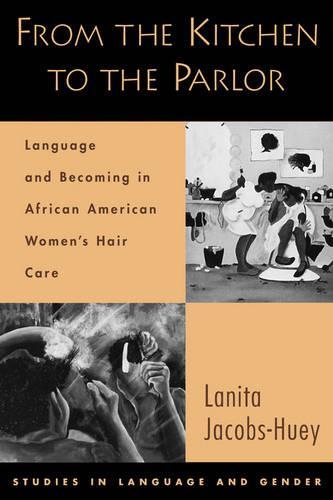Overview
When is hair ""just hair"" and when is it not ""just hair""? Documenting the politics of African American women's hair, this multi-sited linguistic ethnography explores everyday interaction in beauty parlors, Internet discussions, comedy clubs, and other contexts to illuminate how and why hair matters in African American women's day-to-day experiences.
Full Product Details
Author: Lanita Jacobs-Huey (Assistant Professor of Anthropology, Assistant Professor of Anthropology, University of Southern California)
Publisher: Oxford University Press Inc
Imprint: Oxford University Press Inc
Dimensions:
Width: 16.00cm
, Height: 1.50cm
, Length: 23.40cm
Weight: 0.318kg
ISBN: 9780195304169
ISBN 10: 0195304160
Pages: 200
Publication Date: 27 April 2006
Audience:
Professional and scholarly
,
Professional & Vocational
Format: Paperback
Publisher's Status: Active
Availability: To order

Stock availability from the supplier is unknown. We will order it for you and ship this item to you once it is received by us.
Reviews
This work is not only deeply original but it is also brave: Jacobs-Huey has tackled a range of issues that are highly charged, both in the arena of racial politics and, even trickier for her, in negotiating her own place in multiple communities of practice. That she so successfully balances the scholarly, the political, and the personal is testament to her rare combination of considerable analytic talent with keen political and emotional intelligence. --Sally McConnell-Ginet, Department of Linguistics, Cornell University, co-author of Language and Gender Dr. Jacobs-Huey's research on the symbolic and moral meanings of hair in African American communities invigorates the analysis of the linguistic and social construction of personal and group identity. Jacobs-Huey demonstrates that 'hair is not just hair' in the eyes of African Americans, a social fact that, she argues, evidences a wide gulf between European American and African American women. Jacobs-Huey examines how the racial divide is invisible to Euro American women but blatantly obvious to African American women. Jacobs-Huey's study is the first to document how hair is represented in everyday African American verbal interactions across cultrually potent settings related tot he management of hair. These settings include hair salons, cosmetology training institutes, and, fascinatingly, stand-up comedy. --Elinor Ochs, Department of Anthropology, UCLA, 1998 MacArthur Fellow The topic of this book is of great interest to me and other (African American) women for the very reasons Jacobs-Huey explains: Sometimes hair is just hair and sometimes hair is not just hair. In the African American community, hair can be a very touchy, private, painful, prideful, celebratory, 'burning' thing. It is to be approached with caution. Jacobs-Huey does that in this book, and she also tells us about the many meanings, nuances and travails, of hair and its meanings among African American women. --Sonja Lanehart, Dep
This work is not only deeply original but it is also brave: Jacobs-Huey has tackled a range of issues that are highly charged, both in the arena of racial politics and, even trickier for her, in negotiating her own place in multiple communities of practice. That she so successfully balances the scholarly, the political, and the personal is testament to her rare combination of considerable analytic talent with keen political and emotional intelligence. Sally McConnell-Ginet, Department of Linguistics, Cornell University, co-author of Language and Gender
<br> This work is not only deeply original but it is also brave: Jacobs-Huey has tackled a range of issues that are highly charged, both in the arena of racial politics and, even trickier for her, in negotiating her own place in multiple communities of practice. That she so successfully balances the scholarly, the political, and the personal is testament to her rare combination of considerable analytic talent with keen political and emotional intelligence. --Sally McConnell-Ginet, Department of Linguistics, Cornell University, co-author of Language and Gender<br> Dr. Jacobs-Huey's research on the symbolic and moral meanings of hair in African American communities invigorates the analysis of the linguistic and social construction of personal and group identity. Jacobs-Huey demonstrates that 'hair is not just hair' in the eyes of African Americans, a social fact that, she argues, evidences a wide gulf between European American and African American women. Jacobs-Huey examines how the raci
Author Information
Lanita Jacobs-Huey is Assistant Professor in the Department of Anthropology and co-affiliated with the Program in American Studies and Ethnicity at the University of Southern California.




